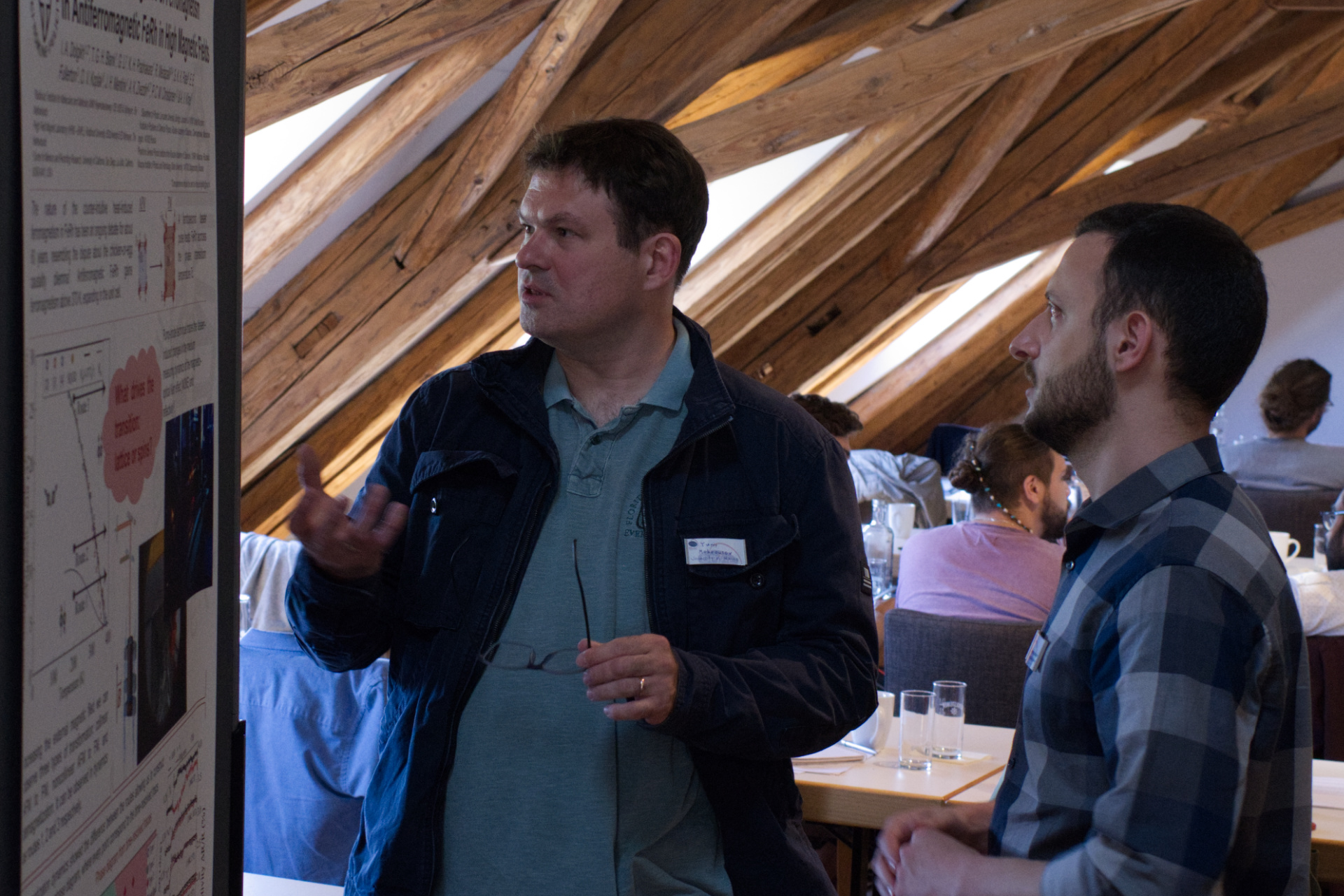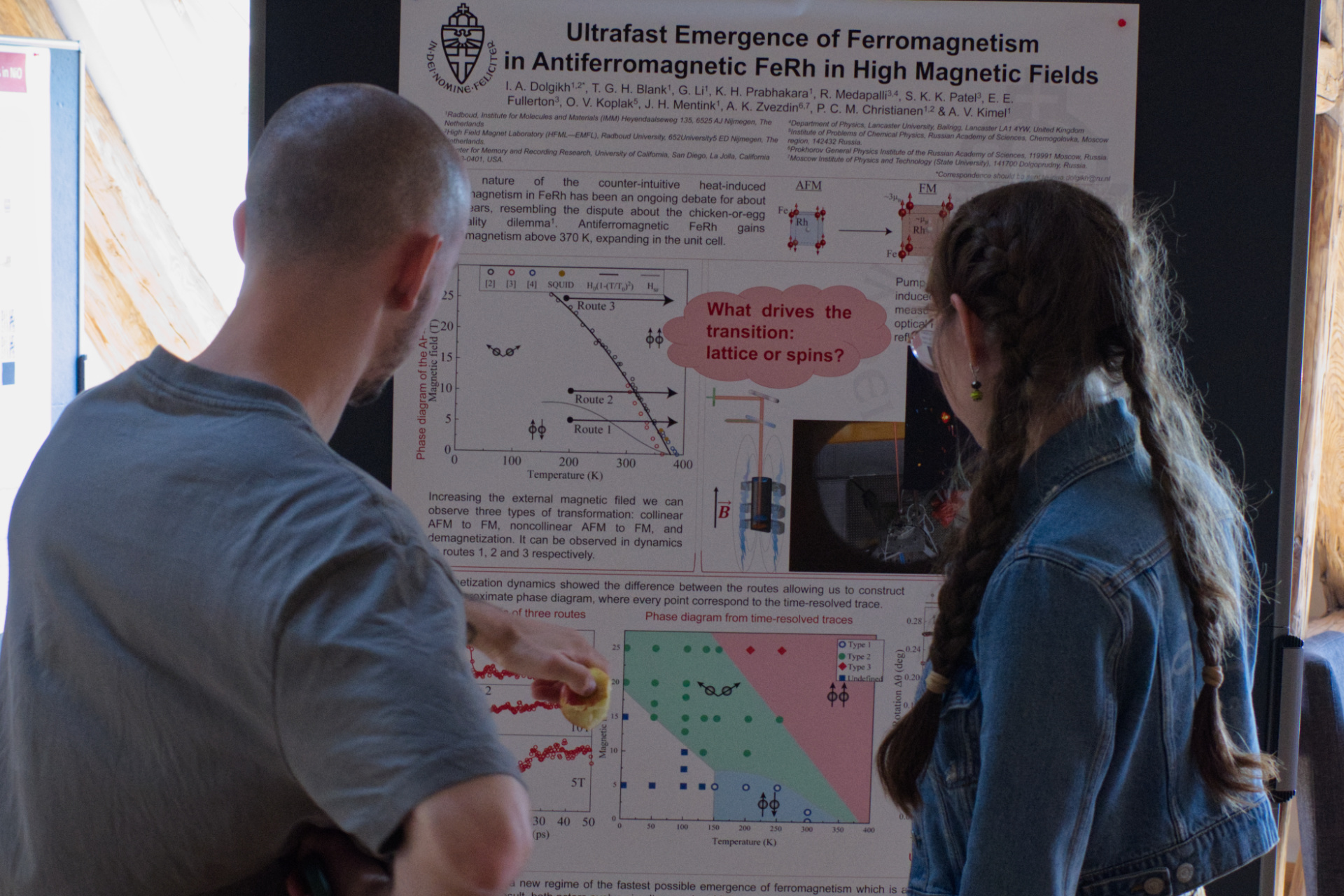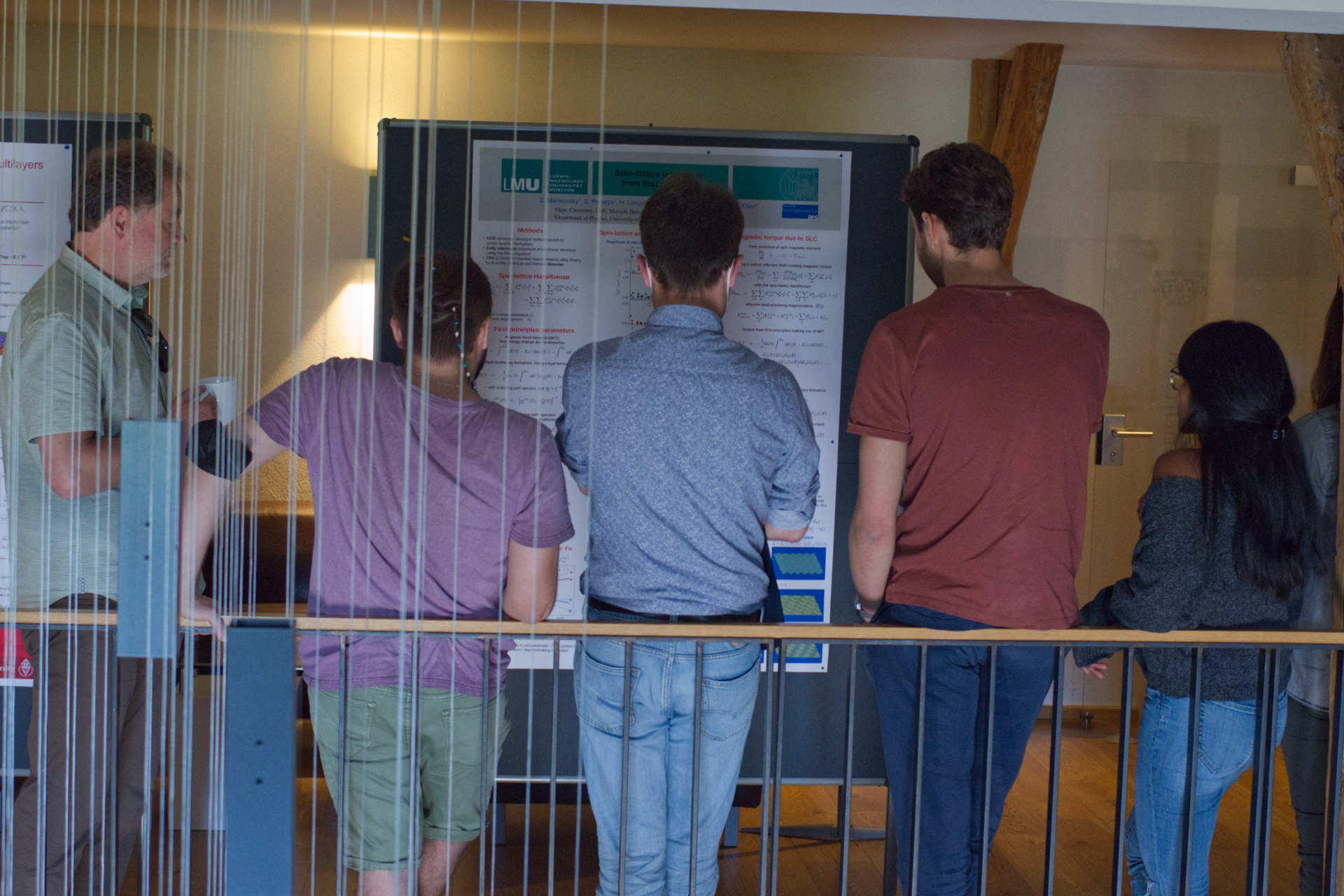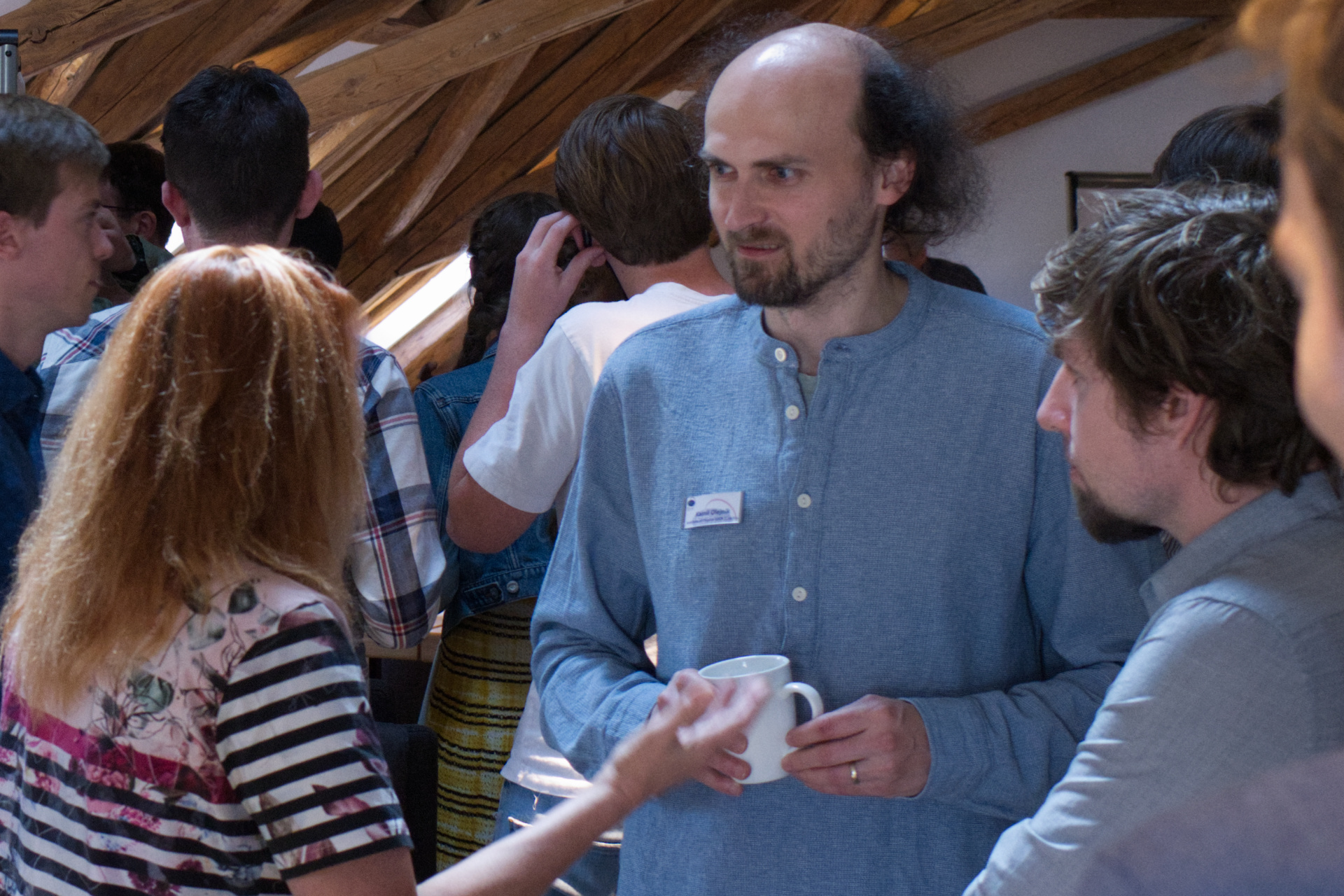Elasto-Q-Mat Summer School 2022: Interplay of multiple degrees of freedom - Charge, Spin and lattice
Workshop, September 12th - 15th 2022
The exotic phases arising from the complex interplay between the electron and the elementary excitation such as phonons, magnons, etc. is one of the prominent aspects of condensed matter physics. The complex interplay often results in different competing ground states with different microscopic properties and different low energy excitations. Disrupting the system by external stimuli such as changing temperature, applying pressure, or doping with different chemical elements, one can manipulate through different phases and try to understand the microscopic multiple degrees of freedom in correlated many body systems. In addition, complex systems offer a great deal of real world applications, however, sufficient understanding and knowledge of many body interactions is first necessary on a fundamental level.
In this regard, the Elasto-Q mat summer school “Interplay of multiple degrees of freedom – charge, spin and lattice” is intended to bring the state of the art expertise in the field of condensed matter physics to educate our PhD student within the SFB Transregio 288 project. Thus, our students have the opportunity to become familiar with the current research both in terms of theoretical and experimental perspective in the diverse field of many body systems.
The summer school consists of a series of lectures from the distinguished Professors who will touch base the basic concept of physics and also provide an insight to their current field of research. Moreover, important issues/questions of the current understanding of the complex systems will be discussed.
This summer school is again organised as a part of the SFB Transregio 288, which is founded through the German Research Foundation (DFG).
The workshop will take place at
Kloster Maria Hilf
Carl-Netter Straße 7
77815 Bühl
If arriving by public transport, take the train to Karlsruhe Hbf. From there you can use the RE2 (to Konstanz) or S7 (to Achern) to get to Bühl station. It takes 15 minutes to walk from the station to Kloster Maria Hilf, alternatively you can take a bus to “Bühl Klostergarten”.
Organizers
Max Hansen, University of Frankfurt
Amrit Raj Pokharel, JGU
Veronika Stangier, KIT Karlsruhe
Invited Speakers
|
Leni Bascones, ICMM-CSIC
Hans Peter Büchler, Universität Stuttgart
Paul Canfield, Iowa State University
Laura Classen, MPI Stuttgart
Matthew Foster, Rice University |
Bruce Normand, Paul Scherrer Institute
Bernhard Keimer, MPI Stuttgart
Marcel Reutzel, University Göttingen
Heiko B. Weber, Friedrich Alexander University |
Young Research Leaders Group Workshop: Spins, Orbits, Charges, and Heat in Magnets
Workshop, July 6th - 8th 2022
- To Image 1
- To Image 2
- To Image 3
- To Image 4
- To Image 5
This SPICE Young Research Leaders Group Workshop serves as a melting pot of researchers to discuss recent developments in our understanding of the interplay between magnetism and spin, charge, orbital, and heat transport. What once began with spin-polarized electric currents in ferromagnets and the giant magnetoresistance, today is an internationally overarching research field known as spintronics. The last two decades, in particular, saw the consolidation of spintronics into modern solid state research. This was possible in large parts thanks to the experimental confirmation of the spin Hall effect and its inverse counterpart that enables electrical detection of pure spin currents. By now, it is known that the electronic spin not only couples to magnetic but also electric fields and heat gradients, adding interconversion phenomena between spin, charge, orbital degrees of freedom and heat to the spintronic inventory, examples being the spin Seebeck, spin Nernst, Edelstein, and orbital Hall effects. Being inspired by both the uncovering of fundamental physics as well as the vision that spin will serve as an information carrier, the spintronics community studied a broad range of material classes, including normal, topological, and magnetic metals as well as topological and magnetic insulators. Magnets, in particular, proved to contain a wealth of surprises, exemplified by topological magnons, topological Hall effects in skyrmion crystals, anomalous Hall effects and spin splitting in antiferromagnets, and the magnetic spin Hall effect. These findings constitute the chalk with which to draw the outlines of next-generation technologies, such as antiferromagnetic and topological spintronics, (topological) magnonics, obitronics, etc.
This workshop is organized by SPICE as part of the Gutenberg International Conference Center (GICC) at Johannes Gutenberg University Mainz (JGU). The GICC is funded through the German Research Foundation’s (DFG) university allowance in the Excellence Strategy program and aims at fostering JGU as a national and international research hub. By organizing regular conferences and workshops in fields of excellent JGU research, the GICC provides a platform to build interest networks and collaborations – to promote exchange and dialog among academics and research groups from all over the world.
Organizers
Alexander Mook, Universität Basel
Helena Reichlova, Technische Universität Dresden
Invited Speakers
Vivek Amin, IUPUI School of Science
Arnab Bose, JGU Mainz
Caitlin Carnahan, Carnegie Mellon University
Arnaud De Riz, CNRS Thales
Dongwook Go, Forschungszentrum Jülich
Börge Göbel, University of Halle
Max Hirschberger, RIKEN Center for Emergent Matter Science
Kouta Kondou, RIKEN Center for Emergent Matter Science
Jay Koo, University of Regensburg
Dominik Kriegner, TU Dresden
Henry Legg, University Basel
Kai Litzius, MPI Stuttgart
Rafael Lopez Seeger, SPINTEC, CEA Grenoble |
Paul McClarty, Max Planck Institute for the Physics of Complex Systems, Dresden
Jonathan Noky, Max-Planck-Institut für Chemische Physik fester Stoffe, Dresden
Satya Prakash, JGU Mainz
Richard Schlitz, ETH Zürich
Eva Schmoranzerova, University of Greifswald
Yuki Shiomi, University of Tokyo
Libor Smejkal, University of Mainz
James Taylor, University of Halle
Jakub Zelezny, Institute of Physics of the Czech Academy of Sciences
Shu Zhang, Max Planck Institute for the Physics of Complex Systems, Dresden |
Orbitronics: from Topological Matter to next Level Electronics
Workshop, July 19th - 22nd 2022
- To Image 1
- To Image 2
- To Image 3
- To Image 4
- To Image 5
- To Image 6
- To Image 7
- To Image 8
- To Image 9
This workshop aims to boost the new field of orbitronics – a next generation device technology which utilizes the orbital current as an information carrier. The orbital current is expected to be crucial in understanding physical properties of topological matters and to interact with various orders and quasi-particle excitations in nontrivial ways, which may shed lights on unresolved puzzles in correlated matters and lead to discoveries of exotic quantum phenomena. The workshop highlights the emerging concept of the orbital current from the perspective of topology and strong correlation, which are two major pillars of contemporary condensed matter physics, and seek for a novel route to achieving orbitronic devices with different materials such as van der Waals 2D materials, topological matters, oxides, surfaces and interfaces. This would not only have significant impact on next-generation of spin-torque-based memories and devices but also open a new venue for spintronics and valleytronics. The envisioned impact of the workshop is to review status-of-the-art and to discuss challenges and future directions of orbitronics by gathering both young and renowned researchers from condensed matter physics, material science, and nanotechnology.
This workshop is organized by SPICE as part of the Gutenberg International Conference Center (GICC) at Johannes Gutenberg University Mainz (JGU). The GICC is funded through the German Research Foundation’s (DFG) university allowance in the Excellence Strategy program and aims at fostering JGU as a national and international research hub. By organizing regular conferences and workshops in fields of excellent JGU research, the GICC provides a platform to build interest networks and collaborations – to promote exchange and dialog among academics and research groups from all over the world.
Organizers
Dongwook Go, Jülich Research Centre
Henri Jaffrès, CNRS-Thales
Tatiana G. Rappoport, Federal University of Rio de Janeiro
Invited Speakers
Ahmet Avsar, Newcastle University
Sayantika Bhowal, ETH Zurich
Luis Canonico, Catalan Institute of Nanoscience and Nanotechnology
Gyung-Min Choi, Sungkyunkwan University
Marcio Costa, Fluminense Federal University
Paul M. Haney, NIST
Junyeon Kim, RIKEN
Mathias Kläui, JGU
Kyung-Jin Lee, KAIST
Hyun-Woo Lee, POSTECH
Jieun Lee, Seoul National University |
Srijani Mallik, CNRS-Thales
Maria Teresa Mercaldo, University of Salerno
Yuriy Mokrousov, Forschungszentrum Jülich/JGU
Peter Oppeneer, Uppsala University
Jagoda Slawinska, University of Groningen
Ivo Souza, Universidad del País Vasco
Sergio Valenzuela, Catalan Institute of Nanoscience and Nanotechnology
David Vanderbilt, Rutgers University
Sara Varotto, CNRS-Thales
Giovanni Vignale , University of Missouri
Laurent Vila, Spintec, Univ. Grenoble Alpes |
Non-Equilibrium Emergence in Quantum Design
Workshop, June 21st - 23rd 2022
- To Image 1
- To Image 2
- To Image 3
- To Image 4
- To Image 5
- To Image 6
- To Image 7
- To Image 8
- To Image 9
Design of quantum many body states which elude conventional thermodynamics, has nowadays become a reality in a number of experimental platforms operating in the far-from-equilibrium regime. This workshop merges experts from three different topical areas exploring non-equilibrium control and engineering, ranging from the microscopic to the macroscopic.
At SPICE we will gather scholars working on fundaments of many-body quantum correlations and frontiers of quantum simulation in closed and open systems, encompassing applications to quantum technologies.
The goal of the conference is foster dialogue at the interface of these different research sectors, focusing on three keynote themes: (1) present and future of quantum many body simulators and their expected impact in the NISQ (noisy intermediate-scale quantum) era; (2) state of art of quantum thermalization and scrambling from the standpoint of statistical mechanics, and its role in the development of a novel generation of quantum devices; (3) survival and control of quantum many-body correlations in strongly driven-open settings.
The structure of the workshop revolves around alternating sessions on these thematic areas, offering a kaleidoscope of three workshops entangled into one. Our invited speakers are equally selected between fundamental and application-oriented areas. We encourage young scientists from all over the world to join us, and we look forward engaging them at our dedicated poster sessions.
This workshop is organized by SPICE as part of the Gutenberg International Conference Center (GICC) at Johannes Gutenberg University Mainz (JGU). The GICC is funded through the German Research Foundation’s (DFG) university allowance in the Excellence Strategy program and aims at fostering JGU as a national and international research hub. By organizing regular conferences and workshops in fields of excellent JGU research, the GICC provides a platform to build interest networks and collaborations – to promote exchange and dialog among academics and research groups from all over the world.
Organizers
Matthew Fisher, UCSB
Jamir Marino, JGU
Gil Refael, Caltech
Invited Speakers
Dmitry Abanin, Univ. of Geneva
Ehud Altman, Univ. of California, Berkeley
Pasquale Calabrese, SISSA
Darrick Chang, ICFO
Kyung Soo Choi, University of Waterloo
Marcello Dalmonte, ICTP/Triest
Eugene Demler, ETH Zurich
Sebastian Diehl, Univ. of Cologne
Mohammad Faghfoor Maghrebi, MSU
Rosario Fazio, ICTP/Triest
Michael Fleischhauer, Univ. of Kaiserslautern
Victor Galitski, Univ. of Maryland
Yuval Gefen, Weizmann Institute of Science
Michael J Gullans, NIST/UMD |
Liang Jiang, Univ. of Chicago
Shane P. Kelly, JGU
Vedika Khemani, Stanford Univ.
Alicia Kollár, Univ. of Maryland
Netanel Lindner, Technion
Katarzyna Macieszczak, Univ. of Cambridge
Giovanna Morigi, Univ. of Saarland
Crystal Noel, Duke Univ.
Markus Oberthaler, Univ. of Heidelberg
Ferdinand Schmidt-Kaler, JGU
Giulia Semeghini, Harvard |
Ultrafast Antiferromagnetic Writing
Workshop, May 9th - 10th 2022
- To Image 1
- To Image 2
- To Image 3
- To Image 4
- To Image 5
While recent developments in photonics enable nearly lossless data transfer with speeds exceeding 1 Tb/s, current magnetic data storage cannot keep up with these data-flow rates nor decrease energy dissipations. Consequently, already now data centres are becoming the biggest consumers of electricity world-wide. Antiferromagnets represent a highly-promising playground for the quest for the fastest and the least-dissipative mechanism of data storage. However, in thermodynamic equilibrium, the energy of interaction of a magnetic field with the antiferromagnetic Néel vector is zero. Despite the 60-year long search for thermodynamic conjugates to the antiferromagnetic order parameter, efficient means to control antiferromagnetism are still being pursued. It is the main reason that hampers applications of antiferromagnets and further development of antiferromagnetic spintronics, magnonics and data storage, in particular.
Although many experimental and theoretical studies make us believe that ultrafast writing of bits in antiferromagnets at THz rates must be possible, such an ultrafast writing has never been demonstrated in antiferromagnetic media and the highest frequency of rewriting of magnetic bits (100 GHz) belongs to ferrimagnets. The landmark of 1 THz remains to be a monumental challenge.
The goal of the workshop is to bring together experts in ultrafast switching of antiferromagnetism, review the state-of-the-art, discuss the present challenges, define short- as well as long-term goals in the field with the ultimate goal to initiate a breakthrough towards the fastest ever and least dissipative writing of magnetic bits.
This workshop is organized by SPICE as part of the Gutenberg International Conference Center (GICC) at Johannes Gutenberg University Mainz (JGU). The GICC is funded through the German Research Foundation’s (DFG) university allowance in the Excellence Strategy program and aims at fostering JGU as a national and international research hub. By organizing regular conferences and workshops in fields of excellent JGU research, the GICC provides a platform to build interest networks and collaborations – to promote exchange and dialog among academics and research groups from all over the world.
Organizers
Tomáš Jungwirth, Institute of Physics ASCR, Prague
Alexandra Kalashnikova, Ioffe institute, Saint Petersburg (inactive as of Feb. 24 2022)*
Aleksei V. Kimel, Radboud University, Nijmegen
Thomas Metzger, Radboud University, Nijmegen
Yuriy Mokrousov, Johannes Gutenberg-University Mainz
Invited Speakers
Dmytro Afanasiev, University of Regensburg
Yannic Behovits, FU Berlin
Davide Bossini, University of Konstanz
Oksana Chubykalo-Fesenko, CSIC
Ankit Disa, MPSD
Olena Gomonay, JGU
Daria Gorelova, University of Hamburg
Andrey Kirilyuk, Radboud University
Reinoud Lavrijsen, Eindhoven University of Technology |
Johan Mentink, Radboud University
Rostislav Mikhaylovskiy, Lancaster University
Uli Nowak, University of Konstanz
Kamil Olejnik, Institute of Physics ASCR
Peter Oppeneer, Uppsala University
Sangeeta Sharma, Max-Born-Institute
Christian Tzschaschel, Harvard
Yoav William Windsor, TU Berlin
Joerg Wunderlich, University of Regensburg |
* Due to a general ban on Russian institutions, Dr. Kalashnikova is no longer an active member of the organizer committee as of Feb. 24 2022. This institutional ban is not reflective on individuals.




























